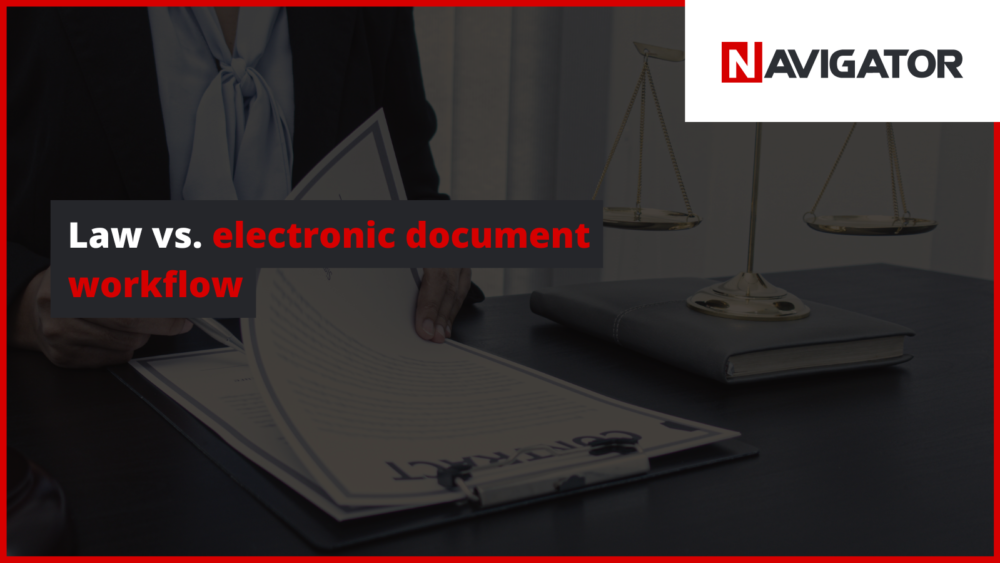In present times more and more entrepreneurs are deciding or considering switching from paper workflow to electronic one. The reason for it, is not only saving time and money, but also paper. After all why keep on printing over and over again when you can have all the data in a dedicated system? There are still many companies clinging to the old method due to lack of knowledge on the subject or misinformation. If you’re also hesitating if it’s the correct choice, we hope this article will help you dispel any doubts.
What electronic document workflow is for?
Electronic document workflow is a n informatic system, which enables document digitalization and workflow management. Its main goal is to optimize work and ensure safety by controlling the information flow and decreasing the data loss risk.
One of the more important benefits that motivates users to work with electronic workflow is the ability to access documentation with any place at any given moment, which is practically impossible with traditional methods. In addiction it allows automating some of the companies processes which, outside of reducing costs, minimalizes the amount of mistakes, positively influencing entire team morale.
Electronic document workflow vs. law – what do you need you know
Law requires entrepreneurs to archive any documents related to business activity. Until recently the only option to keep those was in a paper form but never ending technological progress leads us toward company management and computer-based document archiving.
In most of the countries law acknowledges electronic document workflow as a legal storing method. Nowadays not only private companies, but even the government agencies and medical facilities benefit from electronic documents. Still even though this method is pretty common, there are still worries about legal compliance of digital documentation. In order to authenticate this form, in last years several regulations and ordinances have been published to clear all the ambiguity.
On the 01.01.2019 the Act about employee documentation storage has been passed in Poland. It stated that the electronic employee documentation is legally equal to the paper form. In the case of remote work, this type of documentation is even required, if only the employer is qualified to do that, because of the personal data security.
However it if worth to keep in mind, that after paper to electronic conversion, documents have to be signed with qualified digital signature or they would be worthless. Of course you should be aware of document storage advices. Such as tidiness in archaization with the division by categories and billing periods, and also about offering an easy access to them for every employee that is authorized to do so.
Which documents according to the law should be kept in a electronic form, and which in traditional form?
Even though electronic documents have the same value as paper ones, it doesn’t apply to every single document type. There are still few that need to be stored in the traditional way. Usually the rule is: if document was created in an electronic form, it can stay like that, if it was on paper, it can be uploaded onto electronic device. There are couple of exceptions though.
First one are invoices. Polish law clearly states that they need to be kept in the same way they were created in. It means that you have to store every invoice paper sorted by billing periods for comfortable searching. But if you send this invoice online we can archive it this way.
Electronic form can be kept by documents like: VAT invoices, contracts, payrolls, declarations of will, employee’s documentation and generally all the documents that were send in online form. Also the medical facilities are obligated to digitalize their documents.
When it comes to accounting documents, according to the Accounting Act: accounting books, bank statements and tax declarations or accounting evidences after finishing the Financial Statement, can be stored on electronic devices (with one condition that you own devices allowing us to reconstruct the evidence in the form of a printout).
So you can move this data to electronic devices but you still have to keep their original form in the head office or our branch, in the way of bookkeeping. This archiving method can be also applied to other documents, except for the dot documents.
Summing up, only the documents pointed out by law need to be stored in a paper form. If there is no regulation, you can safely store it on our electronic devices.
Get to know more about Electronic Workflow, AI, Business Intelligence and No-code applications in NAVIGATOR system
Summary
In conclusion, electronic document workflow is not only a rational way to save some resources and optimize processes, but also a valuable tool for business document archiving. It is important to know the differences between the types of the documents and which of them can be stored digitally. Nevertheless, no matter the document type, all of them needs to be stored accordingly to the rules of documentation storage.
Marketing manager, daily expanding her knowledge in marketing and new technologies. Graduate of Film and Television Production at University of Bradford. In her free time, she likes watching films, taking pictures and learning to play piano.





